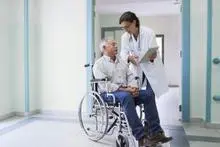Hospital Discharge Leaves Patients Vulnerable To Medical Errors

Coming home from the hospital may seem like a relief for many patients – but too often, it’s actually a dangerous time.
One important study found that nearly one in five patients suffers an adverse event from a medical error after being discharged from the hospital. Most of these adverse events would be prevented by better coordination of care between medical providers and patients. Adverse drug events are the most common of these complications, but hospital-acquired infections and procedural complications also put patients at risk.
Some of the specific risk factors associated with hospital discharge include:
- Being discharged too early. Unfortunately, treatment decisions are often made based on concerns over payment or insurance coverage rather than the patient’s health or well-being. When those concerns result in an early discharge, there is a significant risk of further injury or illness.
- Poorly explained instructions. Any patient who is discharged from a hospital is supposed to be informed of follow-up steps, which will often include, at minimum, taking one or more medications and following up with his or her primary care provider. However, those instructions may not be communicated clearly, putting patients at risk of harm.
- Improperly prepared discharge summaries. One of the most important steps when discharging a patient from the hospital is to provide a summary of all important treatment information to the patient, any caregivers and the primary care physician. In some cases, discharge summaries are missing relevant information; in others, they may not be given to the primary care provider. Either case can lead to inadequate follow-up care.
Transitional care poses dangers to all patients, but especially for older and disabled people with complex medical needs. Failure to effectively coordinate care between providers can lead to dangerous drug interactions, medication errors and other adverse events.
Communication breakdowns among care providers leave patients at risk
In recent years, the federal government has invested billions of dollars in electronic medical records, but there are significant gaps in the system. In particular, nursing homes, rehabilitation facilities and home health providers still rely on antiquated record-keeping systems that put patients at risk.
Patients who require additional in-home care after being discharged from a hospital face the most risk from a dangerous medical error. According to government records, thousands of agencies fail to create and execute care plans or carefully review medications before providing care. Even if the discharge records from the hospital are accurate, if care providers do not follow protocol, serious errors can ensue.
Medication errors are particularly dangerous for patients who require in-home care after discharge because those patients are usually on multiple medications. An incorrectly administered drug can interact unpredictably with the other medications the patient is already taking, leading to serious side effects. Disturbingly, these errors are often part of a pattern of negligence on the part of a medical facility or organization, which can put hundreds or thousands of patients at risk.
Doctors, nurses, pharmacists and other medical professionals owe their patients a higher duty of care, especially during dangerous times such as the transition home from the hospital, and especially for high-risk patients such as the elderly and disabled. Better coordination of care is needed to prevent medication errors and other mistakes that lead to serious injuries or death. And when care providers fail to communicate, they need to be held accountable.

